20 Jun2019
By Phillandra Smith
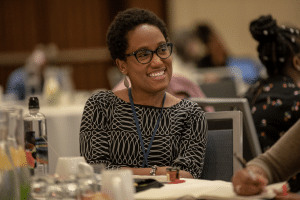 Holmes felt like home. This year was my first time attending the AACTE Holmes Scholar Summer Policy Institute and this was also the first year my university was participating in the program.
Holmes felt like home. This year was my first time attending the AACTE Holmes Scholar Summer Policy Institute and this was also the first year my university was participating in the program.
As one of the two inaugural scholars for Syracuse University, I did not know what to expect. I don’t think either of us did. I knew we were going to Capitol Hill at some point; that was clear to me. I received an outline of the days’ events and sessions, but I still felt like I lacked a point of reference for what I would encounter. To say that I had some trepidation is to put it lightly, but I tried not to let that dampen my excitement. What I did not expect however, were the feelings of validation, empowerment and sense of belonging I walked away with or the relational connections I made over the few days. I am not sure anyone could have prepared me for that. But my gratitude to my university and AACTE for this experience is immense.
20 Jun2019
By Azaria Cunningham

The first time I attended the AACTE Day on the Hill in Washington, DC, was in 2015. At that time, I was one of two in the first Holmes Masters students’ program at William Paterson University (WPU). AACTE had just begun the implementation of adding Holmes Cadets, Holmes Honors, and Holmes Masters students. Before attending the “Day on the Hill,” Holmes held a Summer Policy Institute session, and upon entering the room, I immediately felt a sense of being home. The room was comprised of Holmes Scholars who were pursuing a doctoral degree. Having the chance to be surrounded by successful scholars who looked like me increased my internal drive. Holmes Scholars influenced me to believe that I could pursue earning a doctorate degree. A critical piece of information I learned and always carry with me is that representation matters on all levels, and the ability to see oneself in spaces to enact change is monumental.
17 Jun2019
By Jane E. West
This blog post is written by AACTE consultant Jane West and is intended to provide update information. The views expressed in this post do not necessarily reflect the views of AACTE.
I started last week in NYC visiting a fabulous early childhood program called Beekman House in the south Bronx. They have a partnership with Bank Street College. I was once again rendered speechless (hard to do) by the incredible teaching I saw. It made me want a do-over for pre-k! This is part of EdPrepLab— a new initiative by Learning Policy Institute. Check out the Ed Prep Matters blog article to learn more. Shout out to AACTE for giving me this opportunity!
- House Completes Portion of Massive Spending Bill … To Be Continued Next Week
Members of the House hightailed it out of town Thursday leaving a portion of the $982 billion spending bill completed—but more to come next week. The portion of the bill completed is the Labor/HHS/Education part of which includes $75.9 billion for the Department of Education. The House was in session all night Wednesday, finally adjourning at 4:00 a.m. on Thursday only to return again later Thursday morning.
Rep. Rosa DeLauro (D-CT) wins the prize for no sleep, as she was there shepherding her bill through every minute of the process and the over 100 amendments offered. She reported getting only an hour of sleep noting “You know, you’re so wired!”
17 Jun2019
By Jerrica Thurman

AACTE’s 2019 Washington Week attendees made known their presence in the nation’s capital on Twitter using #AACTEWW19. Photos and tweets of the event’s activities were shared on social media throughout the four-day conference last week, and on June 5 the attendees took over Twitter during their advocacy visits to congressional offices.
Analytic reports reveal #AACTEWW19 received more than 650 original posts, retweets and replies, which yielded over 1 million impressions! In fact, #AACTEWW19 was recognized as trending in Washington, DC by social media monitoring services.
17 Jun2019
By Jerrica Thurman
During AACTE’s 2019 Day on the Hill, the educator preparation community united on Capitol Hill to make their voices heard about challenging issues affecting education. AACTE members, colleagues, and students employed their advocacy skills to elevate the profession in meetings with Members of Congress and their staff. AACTE is excited to have captured attendees in real-time Facebook Live Shows and to highlight their significant work in Washington, DC.
In the video interviews, participants discuss the importance of teacher educators and students from across the nation converging on Capitol Hill to advocate for educator preparation as well as ways to impact education policy in their local areas. They also share how the advocacy training from AACTE’s Day on the Hill sessions prepared them for congressional meetings and key takeaways on best strategies to promote talking points with policymakers. All of the video participants emphasize the important message in the AACTE Washington Week event theme: “Your Voice Matters!”
12 Jun2019
By NCLD
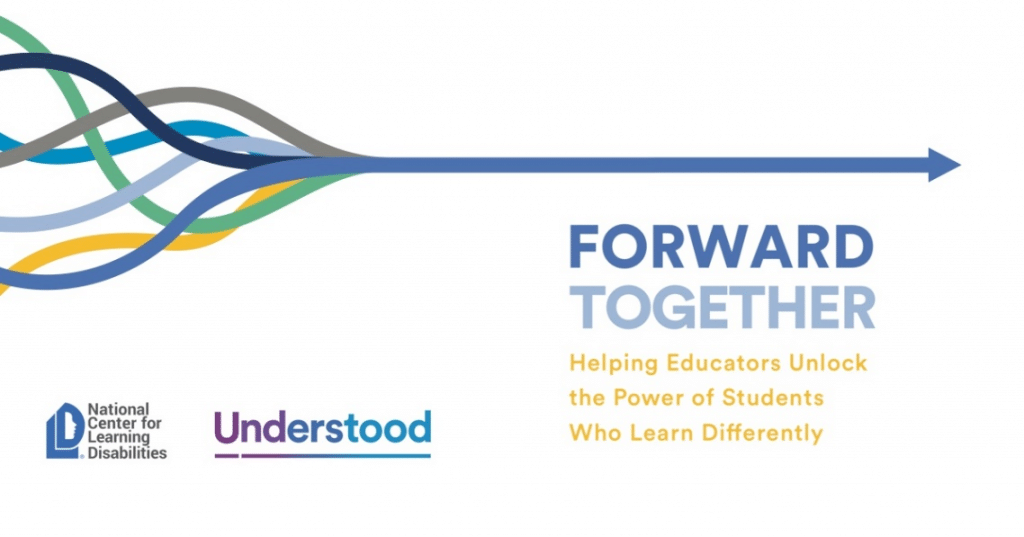
One in 5 students in the United States have learning and attention issues. This includes those with identified specific learning disabilities, diagnosed attention deficit and hyperactivity disorder, or related disorders that impact learning. Despite often having above average or average intelligence, the majority of these students are achieving below grade level. This equates to millions of students across the nation whose strengths and potential are going untapped.
The National Center for Learning Disabilities (NCLD) and Understood set out to unpack and address this problem. We partnered with teachers—often the most consistent touchpoint for students after their caregivers—to understand their experiences and insights. We rooted these experiences in rigorous research focused on general education classrooms, where the majority of the “1 in 5” spend most of their time. The culmination of this work is found in “Forward Together,” a new report from Understood and the NCLD.
AACTE is joining several other education organizations to develop Forward Together Toolkits for our teachers and teacher educators. Stay tuned for more information on the dissemination of those toolkits!
12 Jun2019
By Gretchen Wright
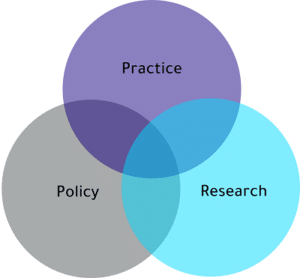 Research shows that teachers are the number one in-school factor affecting student outcomes and principals are the number two factor. One important metric for those outcomes is how well and how equitably our nation’s diverse students are able to navigate our increasingly global and technologically complex world, where skills like critical thinking, collaboration, communication, and being able to apply knowledge in a range of contexts are crucial to success. Today, Learning Policy Institute and Bank Street Graduate School of Education have announced the launch of the Educator Preparation Laboratory (EdPrepLab), a new initiative to help educator preparation programs ensure that new teachers and leaders are able to provide all k-12 students with the kind of deeper learning that helps them develop those skills.
Research shows that teachers are the number one in-school factor affecting student outcomes and principals are the number two factor. One important metric for those outcomes is how well and how equitably our nation’s diverse students are able to navigate our increasingly global and technologically complex world, where skills like critical thinking, collaboration, communication, and being able to apply knowledge in a range of contexts are crucial to success. Today, Learning Policy Institute and Bank Street Graduate School of Education have announced the launch of the Educator Preparation Laboratory (EdPrepLab), a new initiative to help educator preparation programs ensure that new teachers and leaders are able to provide all k-12 students with the kind of deeper learning that helps them develop those skills.
EdPrepLab brings together 15 of the nation’s leading teacher and principal preparation programs to collaborate on further developing and documenting models for preparation that equip educators to advance deeper learning and equity, and that can inform other programs across the nation. The initiative will also support research to improve preparation programs and work with policymakers at federal, state, and local levels to help leverage policies that encourage the use of research-based practices that ensure new teachers and school leaders are well-equipped to provide deeper learning and to build the next generation of equitable schools and instructional education practices.
“Our world has changed significantly since the U.S. education system was first developed, and students today need an education that supports and prepares them for that more diverse, technology-driven, knowledge-based society,” said Learning Policy Institute President Linda Darling-Hammond. “That means we need to prepare teachers and school leaders to provide this kind of education. Fortunately, we have research to guide the way. There is a wealth of new knowledge about the science of learning and development, how social and emotional skills support academic learning, and how to ensure that students really understand what they have learned.”
12 Jun2019
By Prentice T. Chandler and Lisa Barron
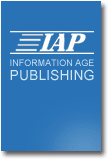 As co-editors, we are inviting you to submit a chapter proposal for the upcoming book, Rethinking School-University Partnerships: A New Way Forward, which will be published by Information Age Publishing. This volume will explore innovative ways in which colleges of education and education preparation providers (EPPs) engage with school partners to improve teacher education and educational outcomes for P-12 learners. The main focus of this book project is to extend the literature in this area and to learn from others around the country engaged in this important work. We are particularly interested in partnership work that addresses mutually beneficial outcomes and persistent issues/problems in teacher education.
As co-editors, we are inviting you to submit a chapter proposal for the upcoming book, Rethinking School-University Partnerships: A New Way Forward, which will be published by Information Age Publishing. This volume will explore innovative ways in which colleges of education and education preparation providers (EPPs) engage with school partners to improve teacher education and educational outcomes for P-12 learners. The main focus of this book project is to extend the literature in this area and to learn from others around the country engaged in this important work. We are particularly interested in partnership work that addresses mutually beneficial outcomes and persistent issues/problems in teacher education.
This book will provide educational leaders in public schools and colleges of education with insight, advice, and direction into the task of creating effective, proactive partnerships. In current times, colleges of education and local school districts need each other like never before. School districts struggle with pipeline-workforce, recruitment, and retention issues. Colleges of education face declining enrollment and a shifting educational landscape that fundamentally changes the way that teachers are trained and what local school districts expect their teachers to be able to do. It is with these overlapping constraints and converging interests that partnerships emerge as a strategy for strengthening the education of our teachers.
The partnerships that we envision are different from the ways in which colleges of education and school districts have traditionally worked with one another. In the past, these loose relationships centered primarily on student teaching and/or field experience placements. We conceptualize “new” partnerships as being proactive, mutually beneficial, pragmatic, and futures oriented. By focusing on people who are leaders in colleges/schools of education and local schools, this book will be well-positioned to help us develop a better understanding of how to initiate and lead change around the concept of partnerships.
12 Jun2019
By Deborah Koolbeck

As we transition into summer in the northern hemisphere, timing for the U.S. Congress gets tight and tighter. August recess looms with a short time frame to wrap up the work on the Fiscal Year 2020 appropriations process in September. How many of the 12 bills waiting to be passed will be completed by September 30? How many agencies will operate under a Continuing Resolution? Will there be a deal to raise the caps on non-defense and defense discretionary spending? When will the federal government reach its debt ceiling and how does that impact the appropriations process? And what is unfolding with the reauthorization of the Higher Education Act?
The AACTE June 2019 Federal Update webinars will share the latest on these questions in this members-only opportunity. Plus there is always time to get your questions answered at the end of the webinar, including topics or happenings that were not covered in the update.
We offer the webinar on two different days and at different times to accommodate schedules and time zones, and we will also post a recording on the AACTE Advocacy Center’s federal page so you can stay in the know even if you cannot attend in person.
Register today!
Tuesday, June 18, 5:00 – 6:00 p.m. EDT
Wednesday, June 19, 11:00 a.m. – 12:00 noon EDT
10 Jun2019
By Jane E. West
This blog post is written by AACTE consultant Jane West and is intended to provide update information. The views expressed in this post do not necessarily reflect the views of AACTE.
After a 10-day Memorial Day recess, Congress returned for a brief three-day session and then hit the road again. They will roar back into town next week with a plate full of funding issues to address.
- Budget and Appropriations: House on the Move!
The House
Democrats are vigorously exercising their hard-won majority in the House by moving rapidly on spending bills for FY 2020. By early next week all 12 appropriations bills will have moved through Committee markups and be ready to go to the House floor. House leadership has announced its intent to see all 12 bills passed by the end of June!
10 Jun2019
By University of Tennessee News

This article and photo originally appeared on the University of Tennessee News website and are reprinted with permission.
A new program aimed at increasing the number of licensed teachers from diverse backgrounds will launch this summer in the College of Education, Health, and Human Sciences.
The program, Increasing Teacher Equity to Address Community High Needs (I-TEACH), is funded by a Tennessee Higher Education Commission grant recently awarded to the college to support diversity in education and to fill critical teaching shortages across the state. The two-year program supports 12 eligible teacher candidates for 33 hours of coursework and clinical practice. Candidates who complete the program will graduate with a master’s degree in teacher education.
10 Jun2019
By Jacqueline Rodriguez

I recently represented AACTE at the Next Educator Workforce: Asking the right questions conference, joining educators from across the country at the Arizona State University (ASU) Mary Lou Fulton Teachers College (MLFTC).
The ASU conference organizers asked the question: Why convene around the idea of the next education Workforce? The response included the following:
- Fewer people are entering the profession.
- More educators are leaving the profession early.
- Educators need more of the sustaining rewards of adult collaboration and efficacy.
Our challenge, according to ASU, is to build broad-based, multilateral partnerships that include colleges of education, schools, districts, and communities committed to designing and fielding new workforce models that make education work better for both educators and learners.
10 Jun2019
By Rosanne Luu
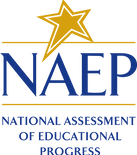 Greetings from the National Assessment of Educational Progress (NAEP) 2025 Mathematics Framework team at WestEd. NAEP, also known as the Nation’s Report Card, measures student achievement in elementary and secondary schools. Public review of the Mathematics Framework draft is underway, and we would like you to be aware of the offerings for stakeholder groups to become informed and, if you haven’t already, provide input on this important document.
Greetings from the National Assessment of Educational Progress (NAEP) 2025 Mathematics Framework team at WestEd. NAEP, also known as the Nation’s Report Card, measures student achievement in elementary and secondary schools. Public review of the Mathematics Framework draft is underway, and we would like you to be aware of the offerings for stakeholder groups to become informed and, if you haven’t already, provide input on this important document.
First, the Mathematics Framework draft, along with further information about NAEP, can be accessed at FNAEPFrameworkUpdate.org. By clicking the “Framework Draft” tab, interested parties can receive directions on how to download, comment on, and upload the draft. AACTE has reviewed the draft framework and provided feedback to NAEP. The draft was available for comment through June 7, 2019.
Additional background information on this work can be found on our website. For example, on April 25, 2019, Suzanne Wilson from the University of Connecticut and Mike Shaughnessy from Portland State University discussed their work on the NAEP Mathematics Assessment Framework on the Math Ed podcast. Also, upcoming opportunities to engage with the draft Framework, such as webinars with members of the Council of Great City Schools, are located on the Outreach Events tab.
10 Jun2019
By Deb Lecklider
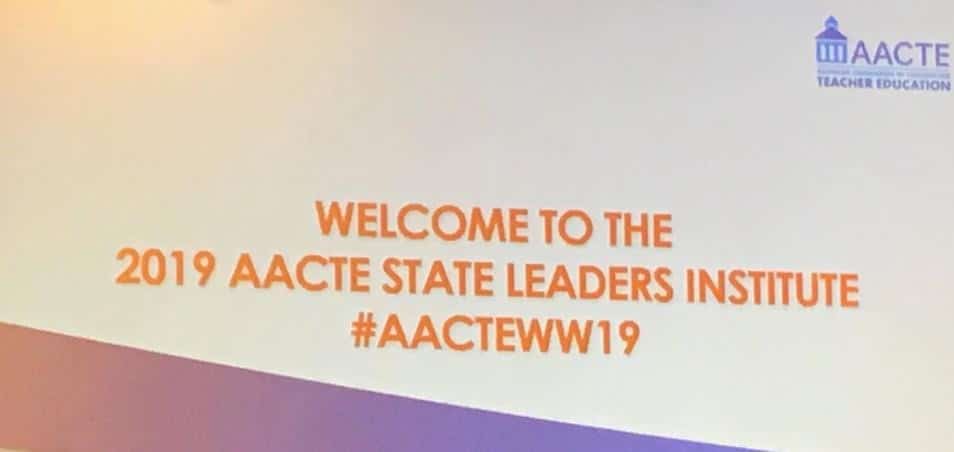
It’s all about people! Being at AACTE’s State Leaders Institute (SLI) on Day one was a true networking opportunity. Starting the day off with a chance to get to know state chapter leaders and AACTE staff members was a highlight of the day. Spending time learning about the leaders who represent educator preparation programs throughout the country is important to all of us.
The moment I walked into SLI 2019, the AACTE staff welcomed us with open arms and immediately provided us with opportunities to network. Regional teams were able to meet and talk about communication initiatives for future monthly conference calls. In addition, we shared ideas on what each chapter provided. The discussion was so robust that we ended up creating a matrix for AACTE to collect pertinent information on each of our chapters so we all have access to the data. Another example of networking was when one chapter leader from Illinois shared their legislative regional team idea where members advocate for education preparation programs at the statehouse.
10 Jun2019
By Ward Cummings
It was another successful Washington Week as AACTE members, students, and partners descended on the nation’s capital to network, advocate, and augment the 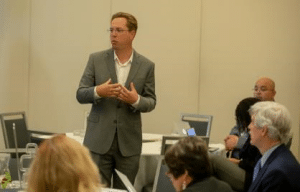 capacity of the profession at the table. There was something for everyone—whether they were attending Washington Week for the first time or were a perennial attendee.
capacity of the profession at the table. There was something for everyone—whether they were attending Washington Week for the first time or were a perennial attendee.
Three signature events comprise AACTE’s Washington Week: the State Leaders Institute (June 2-3), the Holmes Doctoral Scholar Summer Policy Institute (June 3), and Day on the Hill (June 4-5). Kim Metcalf, chair of the AACTE Board of Directors, and Michael Maher, chair of the AACTE Advisory Council of State Chapters, kicked off the week of events opening the State Leaders Institute (SLI).
Focusing on building the capacity of the state chapter and its leadership, SLI attendees learned about the impact of their state’s political dynamics on the development and advancement of education policy. Diving into the challenges of chapter leadership, SLI sessions included the development of sustainable leadership pipelines and the recruitment and retention of chapter membership. Conversations and sessions covered ideas and practices on a host of important issues of interest to AACTE members, including how to attract more teachers to the profession, how to use social media to augment the presence and voice of the chapter and its membership, and how to employ the power of grants to meet state and regional chapter goals.
 Holmes felt like home. This year was my first time attending the AACTE Holmes Scholar Summer Policy Institute and this was also the first year my university was participating in the program.
Holmes felt like home. This year was my first time attending the AACTE Holmes Scholar Summer Policy Institute and this was also the first year my university was participating in the program.




 Research shows that teachers are the number one in-school factor affecting student outcomes and principals are the number two factor. One important metric for those outcomes is how well and how equitably our nation’s diverse students are able to navigate our increasingly global and technologically complex world, where skills like critical thinking, collaboration, communication, and being able to apply knowledge in a range of contexts are crucial to success. Today, Learning Policy Institute and Bank Street Graduate School of Education have announced the launch of the
Research shows that teachers are the number one in-school factor affecting student outcomes and principals are the number two factor. One important metric for those outcomes is how well and how equitably our nation’s diverse students are able to navigate our increasingly global and technologically complex world, where skills like critical thinking, collaboration, communication, and being able to apply knowledge in a range of contexts are crucial to success. Today, Learning Policy Institute and Bank Street Graduate School of Education have announced the launch of the  As co-editors, we are inviting you to submit a chapter proposal for the upcoming book, Rethinking School-University Partnerships: A New Way Forward, which will be published by Information Age Publishing. This volume will explore innovative ways in which colleges of education and education preparation providers (EPPs) engage with school partners to improve teacher education and educational outcomes for P-12 learners. The main focus of this book project is to extend the literature in this area and to learn from others around the country engaged in this important work. We are particularly interested in partnership work that addresses mutually beneficial outcomes and persistent issues/problems in teacher education.
As co-editors, we are inviting you to submit a chapter proposal for the upcoming book, Rethinking School-University Partnerships: A New Way Forward, which will be published by Information Age Publishing. This volume will explore innovative ways in which colleges of education and education preparation providers (EPPs) engage with school partners to improve teacher education and educational outcomes for P-12 learners. The main focus of this book project is to extend the literature in this area and to learn from others around the country engaged in this important work. We are particularly interested in partnership work that addresses mutually beneficial outcomes and persistent issues/problems in teacher education.


 Greetings from the National Assessment of Educational Progress (NAEP) 2025 Mathematics Framework team at WestEd. NAEP, also known as the Nation’s Report Card, measures student achievement in elementary and secondary schools. Public review of the Mathematics Framework draft is underway, and we would like you to be aware of the offerings for stakeholder groups to become informed and, if you haven’t already, provide input on this important document.
Greetings from the National Assessment of Educational Progress (NAEP) 2025 Mathematics Framework team at WestEd. NAEP, also known as the Nation’s Report Card, measures student achievement in elementary and secondary schools. Public review of the Mathematics Framework draft is underway, and we would like you to be aware of the offerings for stakeholder groups to become informed and, if you haven’t already, provide input on this important document. 
 capacity of the profession at the table. There was something for everyone—whether they were attending Washington Week for the first time or were a perennial attendee.
capacity of the profession at the table. There was something for everyone—whether they were attending Washington Week for the first time or were a perennial attendee.